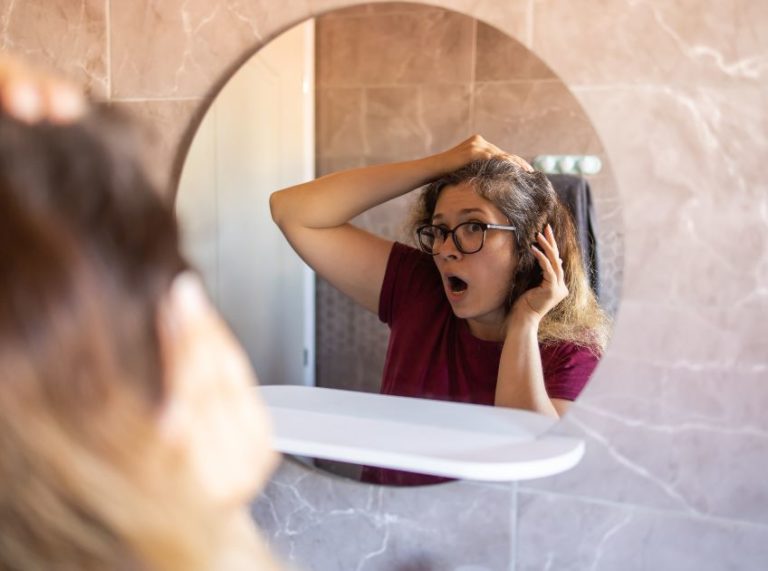
Important: This article is for informational purposes only. Please read our full disclaimer for more details.
Hair gel has become one of the essential hair products in the beauty shelves of many men and women. It helps to achieve different hairstyles with precision. From the perfect slicked back to quiffs, you name them and gel will help you create them.
The convenience and ease of using hair gel have made it one of the hair products that people use every day. Since hair damage and hair loss have become a prevalent problem, it brings people down to the question, does gel damage your hair?
If you also wonder if the gel you use every day is the culprit behind your hair damage, keep reading to find the answer!
Know Your Hair Gel

Do you check the ingredients before you buy hair gel? If not, it’s high time to give it a thought. It is important that your hair gel contains ingredients that suit your hair type and do no harm to them.
While the major ingredient in hair gel is water, which acts as a base for the formula, the other common ingredients are the following-
- Polymers and carbomers- Holds and keep hair in one place
- PVP (polyvinylpyrrolidone)- Coats hair shafts and prevents them from moisture
- Alcohol- Accelerates gel to dry faster
- Parabens- Preserves hair gel for long
- Additives- Offer additional benefits such as improving moisture and texture and providing UV protection.
Hair Gel and Hair Damage
Hair damage can occur due to varying reasons. Luckily, hair gel is not one of them and usually considered safe. However, it can be hazardous for hair health when used excessively and in large quantity.
Usually, you require a small amount of hair gel to fix hair. But those who don’t know how much quantity is sufficient end up using it excessively, which results in hair damage over time.
The reason for hair damage due to hair gel can be contributed to the presence of alcohol in it. Alcohol may cause dryness of hair, making them appear dull. While fatty or long-chain alcohols, such as cetyl alcohol, stearyl alcohol, and cetostearyl alcohol are considered safe, others can dehydrate hair, resulting into hair damage (1).
Dull and brittle hair with split ends and broken strands are common side effects of hair gel that you may experience over time due to overuse.
Hair Gel and Hair Loss

The subsequent sign of hair damage is hair loss; but, we can’t blame hair gel for it all together.
Men use hair gel more often than women. While over and excess use of hair gel can contribute to hair loss, other factors such as age, genetics and male pattern baldness (2) cannot be ignored. Sometimes, all these factors, along with the use of hair gel causes hair fall in men.
What Ingredients to Avoid in Hair Gel?
It is important to be mindful while choosing your hair gel. There are certain ingredients that can do more harm than help to your hair, yet they are present in the hair gel. These ingredients are the following that you need to keep an eye on-
- Propylene glycol: If your scalp feels itchy and irritating that further lead to redness and flaking, it could be a sign that your gel contains propylene glycol. Some people are sensitive to this ingredient and may show even worse side-effects.
- Short-chain alcohols: The presence of ethanol, isopropyl alcohol, and propanol in the hair gel can cause hair dryness. In fact, these ingredients can remove the natural oils present in the hair and make them dull.
- Parabens: Every cosmetic, beauty, skincare and haircare product can contain parabens that are allowed and considered safe. Using prohibited ones can hamper hair health and should be avoided straightaway (3).
What Should Be the Frequency of Hair Gel Application to Prevent Hair Damage?
Often, men use hair gel almost every day before heading out. Even though there is no harm in using hair gel every day, specifically if it contains safe ingredients, it becomes essential to wash hair.
Now, you may wonder if washing your hair every day is safe. Yes, it is safe, specifically when you are using gentle and mild products.
Skipping hair wash can lead to buildup of oil, grease and flakes on the scalp due to hair gel. All this would hamper the scalp health by clogging the hair follicles and cause issues such as folliculitis.
Things to Consider
- You can use hair gel and prevent hair damage when you consider the following-
- Use it for special occasions
- Check ingredients before buying
- Wash hair every day when using hair gel every day
Conclusion
Hair gel is the staple haircare product for many people. However, it should be used mindfully to prevent hair damage and hair loss. Since hair gel contains chemicals, anything synthetic may harm hair health in different ways.
So, instead of making hair gel application your habit, it will be beneficial if you use it once in a while. At the same time, ensure that you wash your hair regularly to avoid buildup due to hair gel.
Image Source : Canva
Related Articles
- 7 Best Hair Gels For Men
- Does Blow Drying Your Hair Damage It?
- Does Color Remover Damage Hair?
- Can Heat Damaged Hair Be Repaired?















